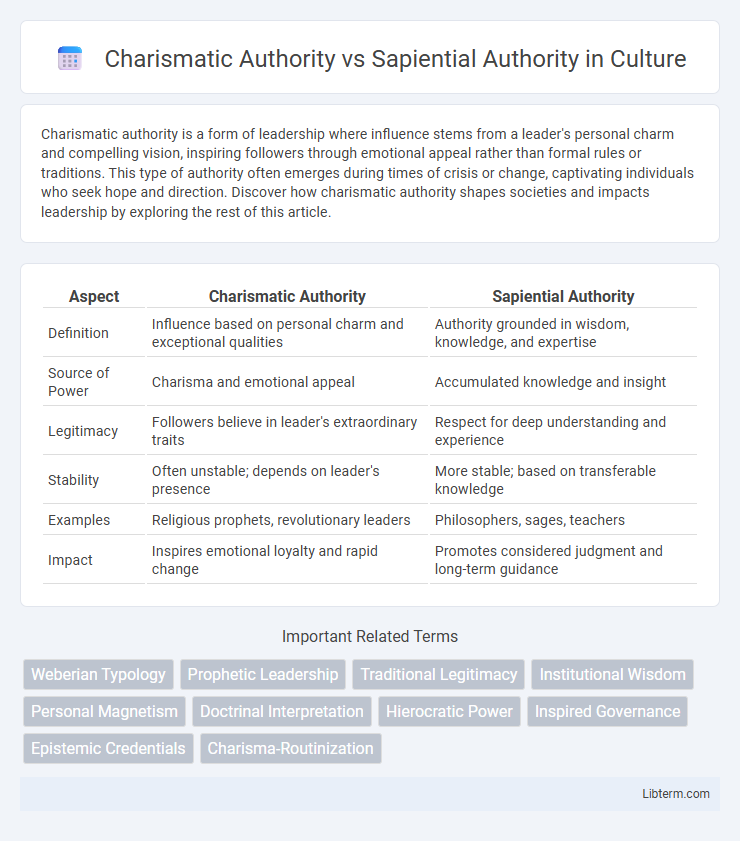Charismatic authority is a form of leadership where influence stems from a leader's personal charm and compelling vision, inspiring followers through emotional appeal rather than formal rules or traditions. This type of authority often emerges during times of crisis or change, captivating individuals who seek hope and direction. Discover how charismatic authority shapes societies and impacts leadership by exploring the rest of this article.
Table of Comparison
| Aspect | Charismatic Authority | Sapiential Authority |
|---|---|---|
| Definition | Influence based on personal charm and exceptional qualities | Authority grounded in wisdom, knowledge, and expertise |
| Source of Power | Charisma and emotional appeal | Accumulated knowledge and insight |
| Legitimacy | Followers believe in leader's extraordinary traits | Respect for deep understanding and experience |
| Stability | Often unstable; depends on leader's presence | More stable; based on transferable knowledge |
| Examples | Religious prophets, revolutionary leaders | Philosophers, sages, teachers |
| Impact | Inspires emotional loyalty and rapid change | Promotes considered judgment and long-term guidance |
Introduction to Charismatic and Sapiential Authority
Charismatic authority arises from an individual's extraordinary personal qualities that inspire devotion and obedience, often linked to leadership during times of crisis or social change. Sapiential authority is rooted in recognized wisdom, expertise, or knowledge that grants an individual legitimacy in guiding others, typically in fields such as religion, philosophy, or education. These two forms of authority differ fundamentally in the source of legitimacy: charisma relies on personal magnetism, while sapiential authority depends on accumulated knowledge and intellectual credibility.
Defining Charismatic Authority
Charismatic authority is defined by the extraordinary personal qualities and persuasive power of a leader, inspiring devotion and obedience through perceived heroism or exemplary character. This form of authority relies heavily on the leader's ability to connect emotionally with followers, generating loyalty beyond formal rules or traditions. It contrasts with sapiential authority, which is grounded in wisdom, knowledge, and rational justification rather than personal charisma.
Understanding Sapiential Authority
Sapiential authority derives from recognized wisdom and deep knowledge, often linked to experts, scholars, and sages whose insights are trusted due to their intellectual or spiritual expertise. Unlike charismatic authority, which depends on personal magnetism and emotional appeal, sapiential authority rests on the proven competence and accumulated understanding that commands respect over time. This form of authority influences decision-making and social structures by valuing evidence-based knowledge and long-standing traditions of learning.
Key Differences Between Charismatic and Sapiential Authority
Charismatic authority relies on the personal charm and magnetism of a leader, inspiring loyalty through emotional appeal and vision, whereas sapiential authority is grounded in recognized wisdom, knowledge, and expertise. Charismatic leaders often emerge during times of crisis, motivating followers with passion and conviction, while sapiential authority is typically institutionalized and respected for consistent intellectual judgment. The primary difference lies in the source of legitimacy: charismatic authority depends on individual traits and personal influence, whereas sapiential authority is based on accumulated knowledge and proven competence.
Historical Examples of Charismatic Leaders
Charismatic authority, as defined by sociologist Max Weber, derives from the personal qualities and extraordinary leadership of individuals like Joan of Arc, Martin Luther King Jr., and Adolf Hitler, who inspired devotion and radical change during critical historical junctures. Unlike sapiential authority, which rests on established knowledge and expertise exemplified by scholars or religious elders, charismatic leaders often disrupt existing structures through their compelling vision and personal magnetism. Their influence relies on emotional appeal and perceived divine or exceptional mandate, shaping movements and societies beyond institutionalized frameworks.
Notable Figures with Sapiential Authority
Notable figures with sapiential authority include intellectuals and scholars whose influence stems from deep knowledge and wisdom, such as Confucius, whose teachings shaped East Asian ethical systems, and Immanuel Kant, renowned for his contributions to philosophy and epistemology. Their authority is grounded in expertise and rational insight rather than personal charisma or emotional appeal. Sapiential leaders often establish lasting systems of thought or knowledge that endure through written works and institutional recognition.
Advantages of Charismatic Authority
Charismatic authority thrives on the leader's personal charm and vision, inspiring deep loyalty and motivation among followers, which often leads to rapid and innovative decision-making. This form of authority fosters strong emotional connections, driving passionate commitment and collective energy toward achieving transformative goals. Unlike sapiential authority, which relies on expertise and knowledge, charismatic authority excels in mobilizing people during times of crisis or change by creating a compelling sense of purpose.
Benefits of Sapiential Authority
Sapiential authority offers the advantage of established credibility by relying on accumulated knowledge, expertise, and wisdom, fostering consistent and rational decision-making. It promotes long-term trust and institutional stability, as followers respect the depth of insight rather than temporary personal appeal. Organizations benefit from sapiential authority through enhanced problem-solving capabilities and sustained intellectual guidance.
Impact of Authority Types on Society
Charismatic authority, rooted in extraordinary personal qualities, inspires rapid social change and mobilizes followers through emotional appeal, often resulting in revolutionary movements or cults of personality. Sapiential authority, based on knowledge and wisdom, fosters long-term societal stability by guiding decision-making through expertise and rational judgment, supporting institutions such as academia, religious leadership, and scientific communities. The impact on society varies as charismatic authority can destabilize existing norms, while sapiential authority strengthens cultural continuity and informed governance.
Conclusion: Choosing Between Charismatic and Sapiential Models
Choosing between charismatic authority and sapiential authority depends on the context and goals of leadership; charismatic authority thrives on personal appeal and transformative influence, while sapiential authority relies on expertise and wisdom for sustainable guidance. Organizations seeking innovation and rapid change may benefit from charismatic leaders who inspire and mobilize, whereas those prioritizing stability and informed decision-making should lean towards sapiential figures grounded in deep knowledge. Effective leadership often integrates both models, balancing visionary charisma with informed judgment to adapt to evolving challenges.
Charismatic Authority Infographic

 libterm.com
libterm.com